

Teachers Edition. 18 Tips for Killer Presentations. Jerry Seinfeld has a skit where he points out that studies show public speaking is a bigger fear than death. That means, he claims, that if you are going to a funeral you are better off in the casket than doing the eulogy. While there isn’t a lot you can do to melt away your anxiety, a the best start is simply to make a better presentation.
Becoming a competent, rather than just confident, speaker requires a lot of practice. But here are a few things you can consider to start sharpening your presentation skills: 10-20-30 Rule – This is a slideshow rule offered by Guy Kawasaki. What tips do you have for making killer presentations? Read full content. Garr Reynolds Official Site. Edunators - Helping Teachers Overcome Obstacles and Focus on Learning - 30 Questions For Teacher Reflection.
Details Written by Mark Clements A lot of college level teacher training programs talk about the importance of developing a “reflective practitioner” but what exactly does this mean for the classroom teacher?
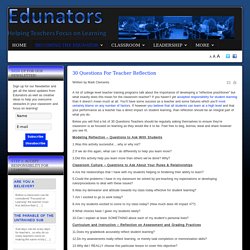
If you haven’t yet accepted responsibility for student learning than it doesn’t mean much at all. You’ll have some success as a teacher and some failures which you’ll most certainly blame on any number of factors. If however you believe that all students can learn at a high level and that your performance as a teacher has a direct impact on student learning, than reflection should be an integral part of what you do. Below you will find a list of 30 Questions Teachers should be regularly asking themselves to ensure they’re classroom is as focused on learning as they would like it to be. Modeling Reflection – Questions to Ask With Students 1.Was this activity successful….why or why not? 2.If we do this again, what can I do differently to help you learn more? All through with this piece? A Taxonomy of Reflection: A Model for Critical Thinking. My approach to staff development (and teaching) borrows from the thinking of Donald Finkel who believed that teaching should be thought of as “providing experience, provoking reflection.”
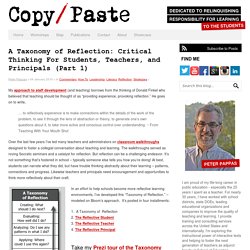
He goes on to write, … to reflectively experience is to make connections within the details of the work of the problem, to see it through the lens of abstraction or theory, to generate one’s own questions about it, to take more active and conscious control over understanding. ~ From Teaching With Your Mouth Shut Over the last few years I’ve led many teachers and administrators on classroom walkthroughs designed to foster a collegial conversation about teaching and learning. Cultivating the Habits of Self-Knowledge and Reflection. Once it’s begun, you can’t fully separate the person from the task.
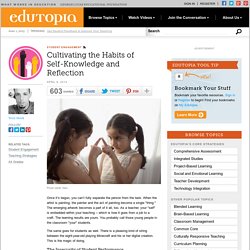
When the artist is painting, the painter and the act of painting become a single "thing. " The emerging artwork becomes a part of it all, too. As a teacher, your "self" is embedded within your teaching -- which is how it goes from a job to a craft. The learning results are yours. You probably call those young people in the classroom "your" students. The same goes for students as well. The Insecurity of Student Performance But this also presents some problems. Did you do your best on your homework? In other words, it's all very personal. The Habits of Insecure Students So it makes sense that students' self-defense mechanisms kick in when they're challenged. Lack of apparent curiosity Apathy Refusal to take risks Decreased creativity Defeated tones Scrambles for shortcuts How we feel and think about ourselves matters in learning. Scripted work Negativity Essays as assessment Talktalktalktalktalktalktalk. Reflecting for Change, From Journaling to Blogging.
On the day of my college graduation, my math education professor cornered me to hand me a gift that would forever set the tone for my career in education.
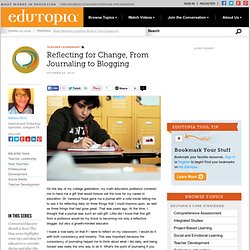
Dr. Vanessa Huse gave me a journal with a note inside telling me to use it for reflecting daily on three things that I could improve upon, as well as three things that had gone great. That was years ago. At the time, I thought that a journal was such an odd gift. The Reflective Teacher: Taking a Long Look. School has been in session for a few weeks, and things might be finally settling down for most teachers.
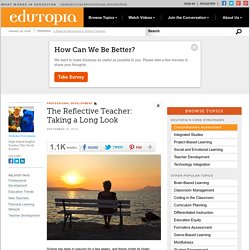
Days seem to pass by so quickly that it seems amazing anything was accomplished. Despite the whirlwind start of the year, it's still important to make time for reflection. It took me some time realize that reflection is vital to my growth as an educator. I also needed to learn what real reflection looked like. It's so much more than thinking that I did a good job or changing one essay question. 1. One always scary but very important thing is asking the students how the lesson went. The first time I handed students a survey, I was terrified. 2. Teachers often think they can remember it all, but that's rarely the case. If you use a planner for your lessons, use sticky notes for initial thoughts after a lesson, and stick them in the planner. 3. Blogging has been one of the biggest parts of my professional growth.